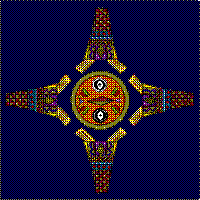
6th Sunday of Easter, 1998
Acts 15.1-2, 22-29; Rev. 21.10-14, 22-23; Jn 14.23-29.
|
The Peace that Comes to One
6th Sunday of Easter, 1998 Acts 15.1-2, 22-29; Rev. 21.10-14, 22-23; Jn 14.23-29. |
The word "peace" occurs consistently in all of the Resurrection appearances and I would like to talk about this in the context of Frank Sinatra's song, because I think that for most of us peace boils down to a kind of inner contentment and self-satisfaction. Although the walls may be falling around us, we are going to be Buddhist-like in our self-containment, quietude, and peacefulness. "Let there be peace on earth and let it begin with me". This notion is totally opposed to the biblical understanding of peace. The biblical understanding of peace is not based on something that exists within a person. It only exists between people. And if peace does not exist between people, no matter how much inner placidity we may feel or manifest, then it is not Christian. Our therapists and pharmacists may be happy about this kind of peace but God is going to be indifferent to it because it does not have anything to do with the peace that Jesus as a good Jew talked about. It does not have anything to do with Shalom or the New Jerusalem - - "the city of peace" - - that the Book of Revelation talks about.
If we look at the career of Jesus, a career in which this great Jewish idea of Shalom reaches its absolute apex, we might ask ourselves, is there an intelligible way (even if we do not carry it out or believe in it) that we can discuss this understanding of peace? I have been racking my brain over this and I would like to suggest one way that we can interpret this kind of peace. The peace that the Bible and the risen Jesus talk about is the peace that comes to one who is ready to receive everybody. For example, if we look back to this passage from the Acts of the Apostles, the crisis of this early Jesus movement was based precisely this question: how widely available was Jesus and his message to be? Thus, not surprisingly, when the Jesus-Jews argued amongst themselves over the centrality of circumcision - - the very sign embodied in the human male genitalia of covenant membership with God - - in the Jewish faith, they discovered that even this highest hallmark of fidelity to God, in the light of Jesus it is not necessary and it no longer counts for anything.
But due to our society's profound and pervasive individualism, we have to be really careful when we think about this business of being available to everybody. Because this can be read and enacted, and I do this routinely, in such a way that we are still basically managing things: "I am in control. I am available to everybody". And so this availability does not make sense until we look at its converse, which means to be ready to be received by everybody as well. I think that this is even more difficult for us North Americans. Namely, being received by everybody, not just receiving everybody; being able to exist in such a way that we will allow ourselves to be received by everybody, which is one of the toughest things to do. And only to the extent that this transformation occurs in us can we really talk about the biblical understanding of peace. And, of course, this peace is cruciform (cross-shaped), as everything in Christianity is. Because this is exactly what got Jesus killed: namely, being able to receive everybody and to be received by everybody, even his murderers.
So, it is good that in this year, Cycle C, we have these readings and this emphasis on the notion of peace. So that, as we conclude the six weeks after Easter, we make sure that we know what it is that we celebrate when we proclaim that God has raised this man, Jesus.
Created: 30 Nov 1996
© Copyright: R. Trojcak, 1996, 1997, 1998, 1999, 2000, 2002
London Ontario Canada
Last Update: September 05, 2005
Comments: rtrojcak@hotmail.com